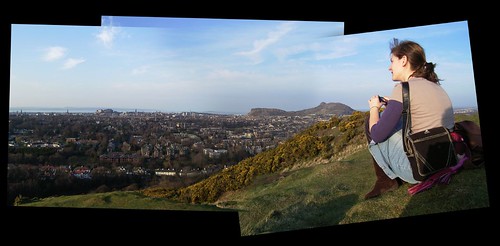
Thursday in the 3rd Week of Lent
Composite Picture
Readings: Jeremiah 7:23-28; Psalm 95:1-2, 6-7, 8-9; Luke 11:14-23
We’re probably all familiar and in agreement with the phrase, a picture is worth a thousand words. And isn’t it also true that several pictures can often be worth more than one? Think, for example, of the person who wishes to take a picture of the panoramic view from the top of a tall building or mountain, but doesn’t have a wide-angled lens. One way out is simply to take several photos and then merge them to form a composite. A picture may be worth a thousand words, but several pictures are better than one.
This seems to be a good metaphor for what our readings offer us today: a composite picture of our situation before God. The first image is a rather bleak one. It captures what our relationship often tends to look like, and is poignantly expressed in God’s words through the prophet concerning his people: they… turned their backs, not their faces, to me… We might imagine a loving father calling out to his children, warning them of the pitfalls of life and teaching them the way they should walk. Instead of listening carefully, however, the children turn and run away. And this picture of children running away from their father is complemented by another one, a snapshot, this time, of their interior condition: they walked in the hardness of their hearts.
As if this combination of images were not gloomy enough, the gospel adds yet another, one that helps us to delve deeper into what is happening to these fugitives, the reason for their flight. Quite paradoxically, their running away is a sign not of freedom but of captivity. The children turn their backs on their father because they have been captured by Satan, the strong man fully armed who stands guard over all his possessions. At this point, the resulting image is bleak indeed. But, thankfully, it remains incomplete.
The good news comes in the form of two further images from the gospel. As stubborn as the children may be in continuing to put as much distance as possible between themselves and their father, on his part, the father simply refuses to let them go. The Kingdom of God has come among you, says Jesus. Or, in another translation, has overtaken you. In Christ, the persistent love of the father pursues and overtakes his wayward children. By his life, death and resurrection, the champion runner, sent by the father, succeeds in catching up with the children. He melts their hardened hearts, defeats and binds up the strong man, and seizes his stolen possessions.
This is the composite image that our readings present. It is a powerful picture, one that is calculated to bring about in us, exactly what they portray. But for that to happen, we must do what the amazed crowds are unwilling to do in the gospel. We must first be able to identify ourselves in the image: to recognize the ways in which we continue to flee from God, to locate the portions of our heart that remain hardened and held hostage by the strong man, and, most importantly, to welcome the different ways in which God is overtaking us. This is what we must do to truly experience the value of this composite image.
Several pictures are indeed worth more than one, but how much are they worth to you today?
The motif of a series of photos being stitched electronically to form a panoramic view of a scene evoke memories of a patchwork quilt, manually being threaded together. A labor of love for someone we love, to convey and to comfort.
ReplyDeleteSimilarly we are mindful to constantly review snapshots of our challenging moments in life and stringing them together for a composite view of who we really are.
In this process of self- examination, we remain conscious that His ever watchful presence shapes and molds us. We live with the certainty that everything happens for a reason and there is a purpose in seemingly disjointed events.
His love is boundless and we are swept up in the torrent of this senseless agape.